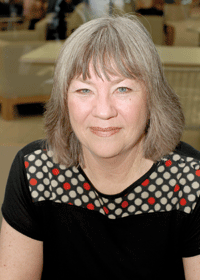
Rhyll McMaster

Rhyll McMaster, born 1947, started writing poetry whilst a child. Washing the Money won the Victorian Premier’s Prize and the Grace Leven Prize. Her poems have been broadcast on national radio and television, in Australia, but Feather Man is her first novel.
From a major profile in ‘The Australian’:
‘Rhyll McMaster finished the first draft of her prize-winning debut novel in three months. But it took the better part of a decade for her manuscript to appear on bookshelves. During those tortuous years trying to secure a publisher, McMaster took to cutting her hair very short.
“Luckily Feather Man was published before I became completely bald,” McMaster says with a laugh from her home in Chippendale, an inner-Sydney suburb of narrow terraces and narrower lanes. These days McMaster's hair is hitting her shoulders, a sure sign of the success the author and poet has garnered following the novel's publication last year.
In March Feather Man picked up the inaugural Barbara Jefferis Award, an annual $30,000 prize for the best Australian novel that depicts women and girls in a positive way, an accolade that took McMaster by surprise.
“I was thrilled to win such a prestigious prize,” she says. “Not that I wrote my novel with anything in mind, but it certainly fits into that category and I am really happy to extend understanding to women's lives.” This week, the book has also taken out a new writing prize in the NSW Premier's Literary Awards The author -- who has five published collections of poetry under her belt as well as her prize-winning novel -- never expected to be able to make a career for herself as a poet or writer. “I was a secretary and I had my own office, so I used to just write poems all day when I was meant to be typing letters for the boss.” McMaster tried her hand as a nurse and a sheep farmer, all the while writing her poetry. When her family moved to a farming district outside Canberra for 12 years, she learned the business of running a farm, and did most of the work as well, except for the shearing. It was only when McMaster's three children grew up, and she finally had a room of her own, that she had the time, or space, to think about writing a novel.
“It's always easier to write a poem on the kitchen table than it is to take years out to write a novel, where you have to be able to follow the trajectory of the thought across a long narrative space,” she says.
“When my youngest daughter left home, I took over her bedroom, bought a computer and sat down and wrote. It was really necessary that I had a room with a door I could close.”’